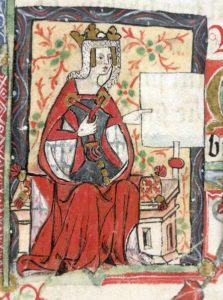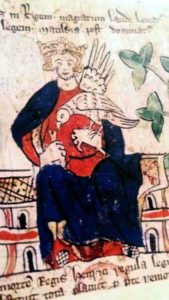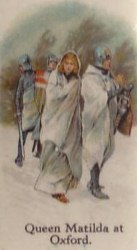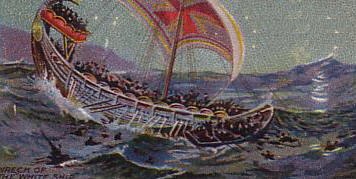From Historic UK
By Ben Johnson
Matilda was an indomitable woman! She was the daughter of King Henry I of England, and was his sole legitimate child after the death of his son Prince William in the ‘White Ship’ disaster.*
She was married first to Henry V of the Holy Roman Empire, and then when he died in 1125, her father Henry married her off again, this time to Geoffrey Plantagenet, Count of Anjou.

Matilda was nominated by her father as the heir to the throne of
England, but in 1135 Stephen of Blois claimed that his uncle had changed
his mind on his deathbed, recognising Stephen instead as his successor
to the throne. The powerful English barons backed this claim.
Matilda was incensed at this news and refused to accept this decision quietly.
Stephen did not have the ruthless temperament required to control the ensuing turmoil as civil war broke out when his dispute with Matilda became common knowledge. This period of civil war became known as ‘The Anarchy’ and lasted for 19 years.

But Stephen was more popular than Matilda, as she was viewed by most of the people as a foreigner and a woman who was married to one of the hated Angevin enemy.
Matilda was also found to have an unfortunate personality. She was proud and overbearing, arranging everything as she thought fit, according to her own whim.
Trouble started in 1141 when the Battle of Lincoln took place between Stephen and Matilda’s half-brother Robert, Earl of Gloucester. After fighting bravely, Stephen was overcome and captured and taken before Matilda who immediately had him imprisoned in Bristol Castle. He was later released.
But Matilda did not get the crown as she had hoped …not because she was lacking in courage …but more because she had an arrogant and haughty manner and was heartily disliked.

Eventually she herself was captured, but true to form, she escaped from Devizes where she was being held, disguised as a corpse.
She was dressed in grave clothes and tied with ropes onto a bier, and carried thus as a corpse to the safety of Gloucester.
In 1142 she was held in Oxford Castle, but again she managed to escape, being lowered from the castle walls on a rope during some extremely bad weather. It was thick snow and bitterly cold, but she managed to reach the town of Wallingford during the night.
Henry, Matilda’s son by the Count of Anjou, the lawful heir and claimant to the English throne, then came to England with it is said, ‘many knights’. This was in fact not the case: he had very few. Unfortunately for Matilda, Stephen’s men defeated Henry’s small force and most of Henry’s followers deserted him.
In 1153 Stephen agreed to the Treaty of Westminster with Matilda’s son Henry of Anjou. This stated that Stephen should remain king for life (in the event this was less than one more year) and then Henry should succeed him.
Upon Stephen’s death in 1154, Henry was crowned King Henry II, the first of the Plantagenet line of kings.
So it could be said that Matilda had triumphed in the end!
* After the successful campaign of 1119 which culminated in King Louis VI of France’s defeat and humiliation at the Battle of Brémule, King Henry and his entourage were preparing to return to England. Prince William and 300 others including his half-sister were to return to England on board La Blanche Nef, the “White Ship”. It is said that both the passengers and crew were celebrating and were very drunk when the ship struck a rock and began to sink. Prince William, his half-sister and all were lost, save a Breton butcher who survived to tell what happened. It is said that after the tragedy King Henry never smiled again.

She was married first to Henry V of the Holy Roman Empire, and then when he died in 1125, her father Henry married her off again, this time to Geoffrey Plantagenet, Count of Anjou.

Empress Matilda, from “History of England” by St. Albans monks, 15th century
Matilda was incensed at this news and refused to accept this decision quietly.
Stephen did not have the ruthless temperament required to control the ensuing turmoil as civil war broke out when his dispute with Matilda became common knowledge. This period of civil war became known as ‘The Anarchy’ and lasted for 19 years.

King Stephen
But Stephen was more popular than Matilda, as she was viewed by most of the people as a foreigner and a woman who was married to one of the hated Angevin enemy.
Matilda was also found to have an unfortunate personality. She was proud and overbearing, arranging everything as she thought fit, according to her own whim.
Trouble started in 1141 when the Battle of Lincoln took place between Stephen and Matilda’s half-brother Robert, Earl of Gloucester. After fighting bravely, Stephen was overcome and captured and taken before Matilda who immediately had him imprisoned in Bristol Castle. He was later released.
But Matilda did not get the crown as she had hoped …not because she was lacking in courage …but more because she had an arrogant and haughty manner and was heartily disliked.

Eventually she herself was captured, but true to form, she escaped from Devizes where she was being held, disguised as a corpse.
She was dressed in grave clothes and tied with ropes onto a bier, and carried thus as a corpse to the safety of Gloucester.
In 1142 she was held in Oxford Castle, but again she managed to escape, being lowered from the castle walls on a rope during some extremely bad weather. It was thick snow and bitterly cold, but she managed to reach the town of Wallingford during the night.
Henry, Matilda’s son by the Count of Anjou, the lawful heir and claimant to the English throne, then came to England with it is said, ‘many knights’. This was in fact not the case: he had very few. Unfortunately for Matilda, Stephen’s men defeated Henry’s small force and most of Henry’s followers deserted him.
In 1153 Stephen agreed to the Treaty of Westminster with Matilda’s son Henry of Anjou. This stated that Stephen should remain king for life (in the event this was less than one more year) and then Henry should succeed him.
Upon Stephen’s death in 1154, Henry was crowned King Henry II, the first of the Plantagenet line of kings.
So it could be said that Matilda had triumphed in the end!
* After the successful campaign of 1119 which culminated in King Louis VI of France’s defeat and humiliation at the Battle of Brémule, King Henry and his entourage were preparing to return to England. Prince William and 300 others including his half-sister were to return to England on board La Blanche Nef, the “White Ship”. It is said that both the passengers and crew were celebrating and were very drunk when the ship struck a rock and began to sink. Prince William, his half-sister and all were lost, save a Breton butcher who survived to tell what happened. It is said that after the tragedy King Henry never smiled again.

No comments:
Post a Comment
Comments are subject to deletion if they are not germane. I have no problem with a bit of colourful language, but blasphemy or depraved profanity will not be allowed. Attacks on the Catholic Faith will not be tolerated. Comments will be deleted that are republican (Yanks! Note the lower case 'r'!), attacks on the legitimacy of Pope Francis as the Vicar of Christ (I know he's a material heretic and a Protector of Perverts, and I definitely want him gone yesterday! However, he is Pope, and I pray for him every day.), the legitimacy of the House of Windsor or of the claims of the Elder Line of the House of France, or attacks on the legitimacy of any of the currently ruling Houses of Europe.